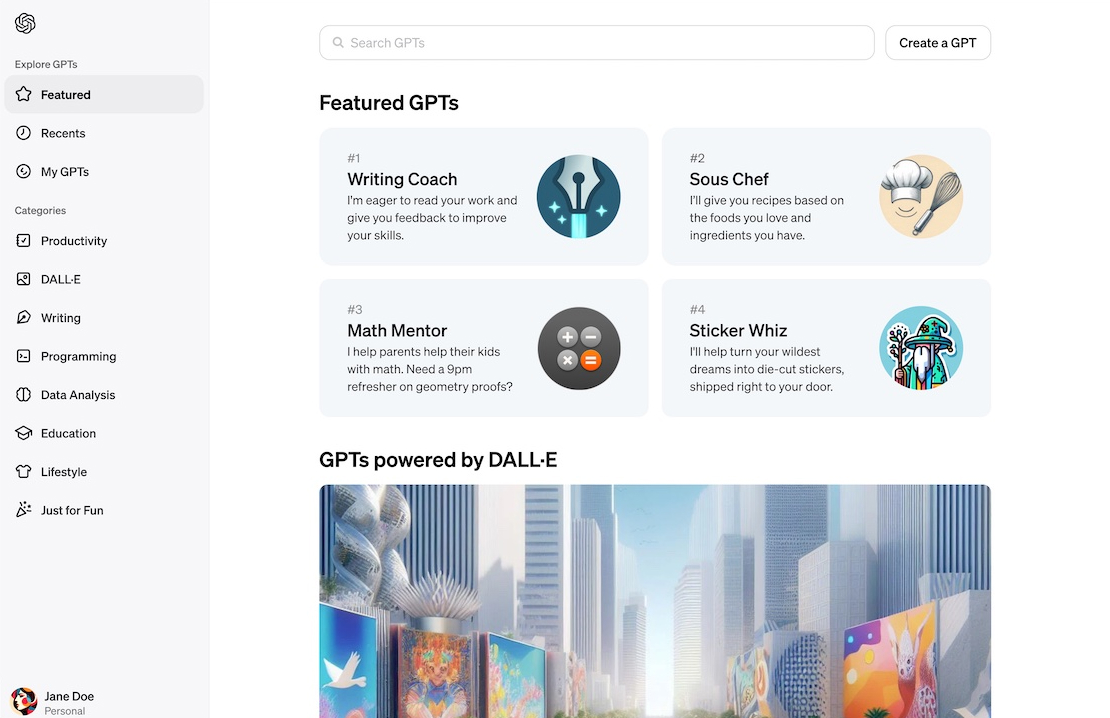- GPTs are here; users can now easily create their own personalized chatbots
- You can now paste in up to about 300 pages of text
- OpenAI is cutting prices: GPT-4 Turbo input tokens are 3x cheaper than GPT-4
- ChatGPT4 will understand your intent versus you having to select Browse with Bing or DALLE3
- OpenAI is now offering copyright defense
OpenAI made a groundbreaking announcement with the introduction of GPT-4 Turbo. It includes custom "GPTs" for ChatGPT users, thus sparking the creator era of chat. These personalized versions of hyper-specialized chatbots empower users to create unique GPT models. Of course, there is a GPT store coming soon to allow creators to share and potentially monetize their creations. I cannot wait to dive into the GPT store. People are so creative, I expect this to be a lot of fun.

This latest version of ChatGPT is a significant leap forward from a knowledge perspective, surpassing the previous data cutoff date of January 2022 and now offering responses based on information up to April 2023. Extending the context window from 3,000 words to 300 pages is even more exciting; now, the platform can handle more real-world applications.
Pricing has gotten better, too, which will make enterprise companies happier. "GPT-4 Turbo input tokens are 3x cheaper than GPT-4 at $0.01 and output tokens are 2x cheaper at $0.03." This is good news, and even though the cost of ChatGPT tokens isn't the biggest financial burden to deployment, every bit a company can save here helps.
Users will no longer have to navigate through options like "Browse with Bing" or use plug-ins; ChatGPT will intuitively understand and adapt to their preferences. This is a bigger win than it may sound. In our experiences testing chat interfaces with users, the chief request they have is to make it easy, intuitive, and to not force them to have to make choices like this to use an app. In fact, even when users say they want choices that allow them to configure their experience, they often don't use them once they are introduced.
Notably, OpenAI's CEO, Sam Altman, made an understated yet significant announcement that went largely unnoticed (Predictive UX posted the news to LinkedIn yesterday to silence 😬). So here it is again:
OpenAI will now defend its customers against copyright infringement claims, removing a major barrier for corporate clients.
This puts OpenAI on par with giants like Microsoft, Google, and Adobe, already offer such indemnification.
Creators for the Win
OpenAI understands the importance of empowering creators and developers with powerful AI tools. With ChatGPT4 Turbo, OpenAI aims to provide a platform for innovation and creativity. Whether you're a writer, programmer, or entrepreneur, ChatGPT4 Turbo is making it super easy for you to create tools to enhance your productivity, boost your business, or start a brand new business.
For writers, ChatGPT4 Turbo can be a valuable companion in the creative process. It can help generate ideas, provide suggestions, and even assist in drafting content. Its ability to understand context and deliver coherent responses makes it a valuable tool for brainstorming and refining written pieces. But I am not convinced writers are truly ready to embrace generative AI just yet. While the writers I know are coming around, the idea of using generative AI is still incredibly offensive to them. This is a shame, because eventually I think most people will come around and late adopters will feel way behind.
I use AI tools as often as possible. So far, my experience has taught me that the creativity of humans is still very much needed in generative AI. I know the argument is that the more we use AI, the more we are training it to replace us, but it just feels so far from that today.
Enterprise Governance
As AI continues to play an increasingly vital role in various industries, the need for robust governance and ethical practices becomes paramount. OpenAI recognizes this responsibility and is committed to ensuring that users of ChatGPT4 Turbo are protected from copyright infringement. This move will go a long way toward helping enterprises adopt GPT4, but the kind of governance that is needed goes well beyond this.
Any AI governance charter needs to address concerns related to bias, misinformation, and harmful content. It's not enough to depend on the giants who are producing AI tools, LLMs, and platforms to handle this for an organization. Companies need to diligently document their charter, processes and procedures for auditing and tracking their AI, and keep a system of record to account for their due diligence.
Furthermore, organizations need to encourage transparency and accountability by actively seeking user feedback and addressing any issues that arise. To help ensure proper mitigation, enterprise organizations need to provide resources and guidelines to help organizations integrate and manage production instances of AI, including ChatGPT4 Turbo, in a responsible manner. Resources should assist in implementing safeguards and recommend monitoring mechanisms to prevent misuse or unintended consequences.
And finally, with the ease of creating GPTs coming down the pike, enterprise organizations need to be ready with their official position on the use of GPTs. The proliferation of GPTs in an enterprise environment could be dangerous and result in employees and contractors leaking data through their GPTs or inadvertently creating a GPT that's biased, unsafe, and hackable.



